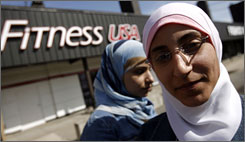
Effort to accommodate Muslim women's modesty spurs debate
Updated 6/13/2006 11:40 PM ET
By Oren Dorell, USA TODAY
Muslim women in the USA have been asking the public to accommodate their religious beliefs about modesty, a trend that some Muslims worry will provoke a backlash.
In some recent examples:
•In Lincoln Park, Mich., Fitness USA relented when Muslim women demanded that the gym wall off a co-ed aerobic center from their women-only section because men could see them working out.
•In Bridgeview, Ill., a Muslim school says it wants its girls' basketball team to play road games against non-Muslim schools provided the public schools ban men and teenage boys from the game.
•In North Seattle, Wash., a public pool set up a swim time for Muslim women in which men, even male lifeguards, are banned.
In all of the examples, businesses and public facilities were asked to accommodate followers of one interpretation of Islamic law that says the sexes must be separate if women are not covered with headscarves and modest clothing.
Meeting such demands could create a backlash against Muslims, says Zuhdi Jasser, chairman of American Islamic Forum for Democracy, which advocates separation of religion and government.
"In the long term it does not serve to build friends and bridges with the Western community," says Jasser, a Muslim.
"You're not going to make your American, Christian and Jewish friends to feel comfortable ... which in the end could create a dislike for Muslims that is unnatural."
But other Muslims see the trend as an issue of civil rights.
Salam Al-Marayati, executive director of Muslim Public Affairs Council, says the right to petition for special accommodation based on religious beliefs is protected by the First Amendment.
"Whether a woman wants to cover her hair or not is her personal choice," he says. "As long as it's not imposed on the rest of society then I don't see any problem."
Walid Phares, a professor of Middle East studies at Florida Atlantic University, sees it as an early sign in the USA of a global Islamic movement to pressure Western society into abiding by Islamic laws.
"These demands exist because there is an ideology of a militant movement to slowly but surely demand more," Phares says. "They will be building on it."
Phares says the conservative Saudi branch of Islam, known as Wahhabism, is trying to assert itself as representation all Muslims in the USA and makes demands most Muslims disagree with.
But Ebrahim Moosa, professor of Islamic studies at Duke University, says the requests are attempts to integrate with U.S. culture. They show "that America can become their home," he says.
No comments:
Post a Comment